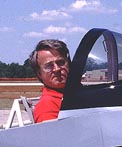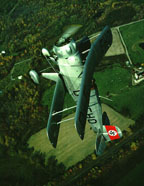 Grassroots
Grassroots 
Budd Davisson, Plane and Pilot
Thank Them When you Can
I got a sad piece of mail the other day. As I opened the envelope, a piece of torn newsprint fell out on the table. I scanned it for a second, not being able to figure out who would be sending me a torn newspaper. Then I saw it was a portion of an obituary column and, at the bottom, circled in black, was the name Marvin Tobin.
I don't suppose many of you knew Marv Tobin; as a matter of fact, I doubt if anybody reading this has even heard of Marv Tobin. However, for the past ten or fifteen years, once a month I'd say to myself, "You ought to pick up a phone and call Tobin to say thanks." But I didn't and now I've lost my chance.
Marv Tobin was one of those per-upbringing and who, in later years you realize made important contributions in your life. During my teen-age years in a small Nebraska town, Marv Tobin ran what was to me a gold mine of artifacts and information . . . he ran the automotive junkyard.
I was one of a dozen scrawny teenage kids who used to show up at Tobin's with a couple of wrinkled dollar bills in our Levis to swap for that magic piece of metal that would make our streetrod a little better than the next guy's. I still remember the excitement of pedaling home on my bicycle with a '37 Ford beam axle - you know, the round ones used in the V-8 60s-laying across the handlebars. Today that same axle lives under the front end of the V-8 street roadster I've never been able to force myself to part with.
More importantly, it was Marv Tobin who introduced me to the magic machine work: I spent hours standing around amidst the piles of long-dead batteries and leaking hydraulic cylinders watching his big, old flat-belt lathe effortlessly extracting curls of metal from the drive shaft he was chopping for me or a special tapping tool for cutting those peculiar threads Ford tie-rod ends used to have.
It was Tobin who first showed me the proper way to set up and light a cutting torch and how to surgically remove the head off a bolt without so much as scorching the metal underneath. I wonder how many generations of kids learned the same things at Tobin's cafeteria of cast-iron exotica. I hope some of them said "thanks," because I waited too long. But I won't make that mistake again. Not with the others who, like Marv Tobin, passed on some of their skills and some of their knowledge and are still around to be thanked.
I often think about those I need to thank. As I'm slipping down final in my Pitts or orchestrating the union of two pieces of 4130 steel with a welding torch, I'm extremely conscious of the fact that my hands and my brain weren't born knowing how to do these things. More importantly than simply knowing how to do them, I know that the respect and the emotionalism I attach to a tangible job well done came from those individuals who imparted both the skill and the attitudes. We are all what others made us by their willingness to share at a time when we were ready to learn. Every single person out there has gone through the same process. All of us are part of the age-old process of passing along knowledge, skills and attitudes, and it's important we recognize those who touched our lives, and in so doing, altered them forever.
I'd like to thank Fred Deeds. Deeds was my junior high basketball coach and science teacher. More than that, he was an ex-Mustang pilot who had only ten years before been at the controls of a B-model Mustang as a part of Don M. Beerbowei's squadron in the Fifteenth Air Force. 'That was a time when every thirteen year-old kid in Nebraska had a severe cold from rushing home after basketball practice, hair still wet from showering, so as not to miss Annette doing her thing on after school television. We were adolescents just coming up on the brink of real juvenile delinquency. He took the time to give me a feeling for the highs and lows of flight training; of coming in from a blistering day on the flight line to stand under the shower, semi-comatose, but happy all the same. It was he who loaned me his fighter group's annual, which smelled of mothballs but implanted visions of aerial grandeur in my formative young brain. It was also he who stood behind me in the hallway as I combed my ducktail (while wearing my best black shirt and pink tie to a dance) and told me I'd better change my ways or I 'was going to wind up in reform school. I guess I did, because I didn't. Thank you, Mr. Deeds. Now that I have flown Mustangs and a few other birds in between, simply saying thanks isn't nearly enough.
And then there were the Vogel brothers: the Vogel boys ran what had to be one of the very last honest-to-God blacksmith shops in the entire United States. As late as the early sixties that fantastic old livery barn still sang with the sound of the single overhead shaft driving a multitude of old-fashioned trip-hammers and drill presses via slapping flat belts. Any one of the three Vogels could do anything with steel-anything! Watching them stick a plowshare into the forge, and reaching up to give a couple of pulls on the bellows handle, every so often inspecting the color of the plowshare for the exact rosy glow that was needed, was to me as intricate and as important as open-heart surgery. They were artists in steel and knew exactly how many blows of a hammer a piece of semi-molten steel would take before it lost its color and the all-important ability to be formed freely. The older of the three, Chris, seemed particularly willing to show this. greasy-haired misfit how to control slag buildup when using an arc welder and how to form a perfect ring out of a one-inch bar of steel by judicious hammering and heating. Probably the most important thing I learned from the Vogels and their black-iron classroom was how to deal with, and what .it meant to be, mid-western. I learned quickly that they were a certain breed of people, like so many others from my home state, who worked a certain way. If you said, "It's all right, Reuben, just get at it when you can; I don't need it for a coupl'a weeks," you'd have it the next day. If you came in all hot and bothered and said, "I need this as soon as you can possibly get to it - I'm in a hurry," it would be two weeks at the minimum. God, I used to love to stand and watch those old men work. To the surviving Vogels I can only say thanks. I may never own my own forge and 'I haven't thought much about hard-facing plowshares since I was sixteen, but every time I stick a new electrode into the holder or watch a torch burst into life, the Vogel brothers flicker across my mind and into my hands.
I haven't seen a guy named Ron Epps since 1959 at the now defunct Union Airport in Lincoln, Nebraska. The occasion was an important one for me. I had just passed my private pilot check ride and he was there to congratulate me and, I suppose, marvel at his handiwork. The thing I remember most about Ron was, no matter how screwed up I got, he always seemed to be in control of me, the situation, and himself. I was just another one of his students and I suppose it's a million to one that he even remembers me at all. I can still picture him down on his haunches with his back to the grass runway as I pushed the throttle forward and forever altered whatever plans the future had for me. I've had many flight instructors since, but Ron was the first, and midwifed the birth of a new birdman.
I suppose every aviator can turn around and look at his life, at one individual outside his immediate family who stands tallest as one whose effect has been farthest-reaching and longest-lasting. In my case it was Paul Clark-one of the proudest and most gentle men I've come to know in this business. Paul ran the Flight Training School at the University of Oklahoma and became my instructor, my boss and my friend during my years there. Paul did q lot more than simply teach me the fine art of putting a 7EC Champ down on the runway in the twenty-knot crosswind we considered normal in Oklahoma. He did his very best to teach me the art of relating to people and the fact that they were flying students was incidental. Paul Clark was one of those rare, gifted individuals to whom teaching flying was a higher calling to which you dedicated your all in producing a pilot who loved flight and everything it represented. To him an airplane was more than a machine, and the student much more than someone to be harped at for an hour. What Paul Clark taught me about aviation and the part it plays in life, both physically and emotionally, is something to which every aviator should be exposed. I am certain there are a thousand pilots out there who have similar reasons to thank Paul, and I hope just a few of them take the time to say thank you, with a note to the FAA Center in Oklahoma City where he now spends his time trying to help make sense out of FAA written exams.
To Marv Tobin: I am certain nobody who knew you will read this but it doesn't matter. All that matters is that I spent a little time with you and benefited greatly. I'm only sorry I waited so long to say thanks.
 Grassroots
Grassroots 
 Grassroots
Grassroots 